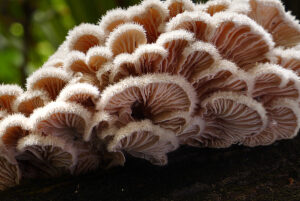Mushrooms as natural replacements for plastics, textiles, and other materials

Variants of Schizophyllum commune can be grown as natural alternatives to plastic, textiles, and other materials. (Photo: Bernard Spragg/Wikimedia
June 9, 2025 – Scientists at McMaster University have developed a method to grow variants of a common mushroom species that can be used as tailored, biodegradable alternatives to textiles, plastics, packaging, and other environmentally harmful materials. Their research focused on natural genetic variations in the Schizophyllum commune mushroom (known in English as split gill and in Dutch as waaiertje).
Although mushrooms are already used to create eco-friendly products, manufacturers face challenges due to wide variability in strength and flexibility, even among fungi grown under identical conditions.
In this study, researchers examined how genetic variation influences the properties of the fungal mycelium. These structures can be harvested and processed into sustainable materials like vegan leather and foam alternatives.
The study was published in late May in the Journal of Bioresources and Bioproducts under the title:
‘Splitting the Difference: Genetically-Tunable Mycelial Films Using Natural Genetic Variations in Schizophyllum commune.’









